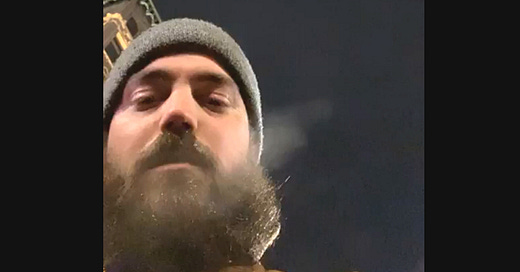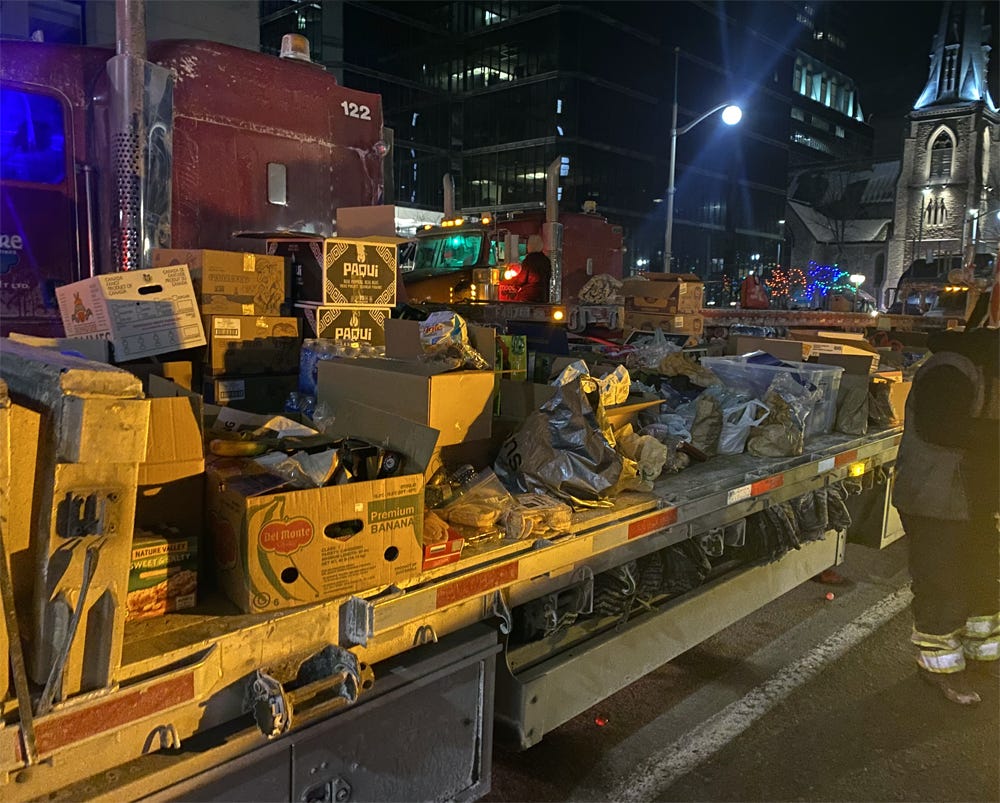Part 1: Nothing Made Sense
On Clayton’s second day in Ottawa, the western arm of the Freedom Convoy arrived in town, as did others from Quebec and eastern Canada. "There were no problems those first few days,” he says. "Nothing bad happened." No windows had been broken, no looting had occurred, no public buildings had been stormed. Nothing had been set on fire. This was a huge, happy, peaceful crowd of ordinary Canadians from all corners of the country.
He'd intended to return home after the weekend was over, "but what drove me to stay was the Monday when the news started coming out, labeling us as terrorists and violent extremists," even though the reality "was completely the opposite. That's what clicked in my mind, when I said 'Something isn't right. Why are they doing this?'"
That afternoon, Clayton posted a photo on Facebook of himself and three other young men standing beside a pickup, with Jerry cans and a wagon. “Let me tell you about these guys,” he wrote:
After day 2 my truck was running low on diesel. Down to the last jerry can. I was told to text a number and they could help.
Shoot them a text and they came from their hotel to my truck got jerry cans and walked to multiple gas stations before they could find diesel. They walked 4 jerry cans full out to me so I could refuel my truck and some others.
This was these guys complete goal. All they did when they were here was walk gas and diesel out to people. I did a run with them and we had 10 jerry cans to walk.
While walking person by person would help us and take a can until there was only 1 can being carried by each person.
This is the kind of stuff that’s not being shared
Bless these guys!
Shortly afterward, he met a man from British Columbia "who ended up spending two and a half weeks with me in my truck. I got to know him pretty well." That chap had a hotel room, at which Clayton and others could grab a shower.
Soon people started asking if they could stash fuel in Clayton's trailer. "I would constantly have people coming up. 'How do I get fuel to you guys?' Or 'Come with me, I’ve got some fuel.'" The groundswell of people who "just wanted to help in any way that they could" also convinced him to stick around:
Right behind me, there was a truck driver from Saskatchewan that had all kinds of food on his flatbed truck. I had a tent, so I set that up and we tarped it all in and loaded all the food in there. But it got so packed, we needed a second tent. And that was within two days.
So we set up the second one and tarped up all the walls. And it got so full that there was a team of ladies, I believe they were Russian ladies. And their job for two days was to just organize things. It turned into a whole cooking station and grocery store. Right on Wellington.
As the protesters settled in, he says, homeless people would come by each evening. "And we'd tell them, 'Take as much as you want.' Because it was coming in faster than we could handle it, from every direction. So them saying that we robbed the homeless, it's a crock of shit.”
He continues,
I remember telling some of the guys on our block, 'Whether we've got too much or not, we need to take it. Because that's what these people are feeling is helping us.' We had boxes of bars of soap, boxes of deodorant. I think, in my tent, we had six barbecues. Generators that were just donated - brand new in the box. A generator a day.
Some of Clayton's memories from those weeks are bittersweet. "The kids that would come up to my truck and hand me cards. And parents crying because their kids" were being sat near open windows at school in the middle of winter. "And the Europeans, the old ladies that would come up and tell me to never leave because they'd come from a Communist country and they could see what was happening" here in Canada.
And a guy I call Veggie Guy. He walked from Quebec, over the bridge, every single night with a wagon. He had his route. And his mom, during the day, would cut up bags of veggies and ranch dressing. Every single night he would come down and he'd have wraps or something hot for us. And every time he stopped by he'd give me a joint, two bags of veggies, and whatever sandwich his mom was making. He was probably 35, 40.
One night he's like, 'I had to bring my mom down.' So I thanked her for all the sandwiches and the fresh veggies. Every morning, there'd be locals that would go to Tim Hortons and get boxes of coffee. I can remember a guy going to McDonald's and buying 400 burgers. Just handing them out.
On one occasion, an Ottawa resident walked truck to truck distributing cans of beer. When Clayton teased him about being an irate local, he responded “Well, there are some people in my building who hate you guys, but I like you."
One day Clayton was approached by "a gentleman and his 12-year-old daughter. 'We hear you're the fuel guy. My daughter has a question for you.' So I looked at her and she says, 'I want to tell my grandkids that I was part of this. How can I smuggle in fuel to help you?'" Clayton's understanding is that they'd driven into the city from a couple of hours away. They had bicycles - the dad's with an attached baby carrier trailer. They spent much of that day, he says, cycling to a gas station several city blocks distant, filling two Jerry cans at a time, concealing them in the baby carrier and delivering them to his trailer. "She had the biggest smile on her face," he remembers.
By then he himself was being given frequent cash donations to purchase fuel. Clayton tried to pass some along to the dad, who declined. "No, no. This is my contribution. I want to do this." The dad was "a short, stocky guy," he recalls. "He ran some businesses, he was affected by all the lockdowns."
next installment: That Relationship Changed My Life









Beautiful story. He would not let his brothers and sisters be persecuted and slandered without a fight! Ottawa was a testament to the love and perseverance of Canadians.